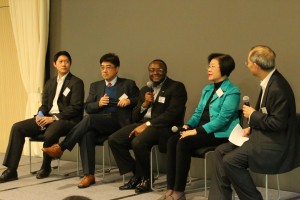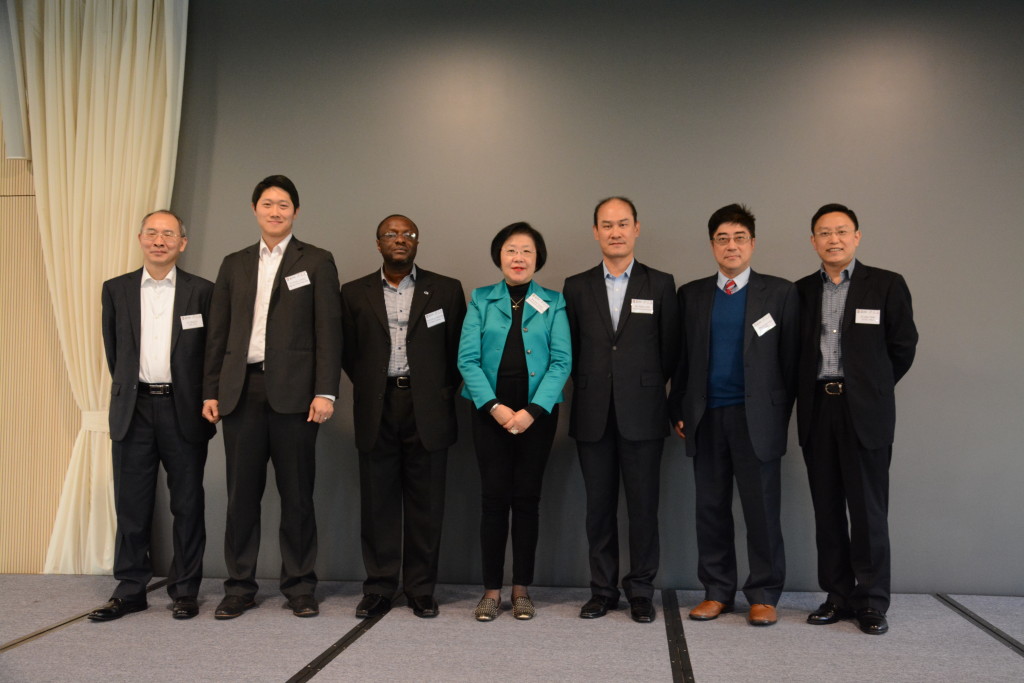On 06 January 2015 nearly 200 professionals from the HKSAR Government, the building industry, institutions and academia witnessed the launch of the Hong Kong Zero Carbon Partnership at the Zero Carbon Building, Kowloon Bay, Hong Kong.
The undertakings took place over the first of the Partnership’s seminar series, which is entitled ‘Zero Carbon Buildings: International Practice and Stakeholder Engagement’ and was co-organised by Construction Industry Council (CIC), Zero Carbon Building Limited (ZCBL), and Centre for Innovation in Construction and Infrastructure Development (CICID) of The University of Hong Kong, with support from Hong Kong Housing Authority (HKHA), Hong Kong Green Building Council (HKGBC), China Trend Building Press, Pennsylvania State University, Zero Carbon Hub, Kadoorie Institute and Asia Energy Studies Centre. At the seminar a blend of local and overseas speakers shared the state-of-the-art knowledge and practices of zero carbon building.
(From left to right are Dr Guiyi Li, Dr Andy Chou, Prof Chimay Anumba, Ms Ada Fung, Mr Albert Lam, Dr Raymond Yau, and Dr Wei Pan)
The zero carbon building approach has been adopted in many countries and regions as a government strategy for addressing climate change. However, how stakeholders can work in partnership for delivering zero carbon buildings effectively remains a socio-technical challenge. The Hong Kong Zero Carbon Partnership addresses this challenge by drawing on a research project led by The University of Hong Kong with CIC’s funding support. The Partnership aims to help position Hong Kong as a world-class knowledge based, innovation driven and multi-stakeholder engaged hub for zero carbon building in urban environments.
Dr Guiyi Li, Director of ZCBL of CIC, kicked off the seminar by welcoming all to the launch event of the Partnership. Dr Li shared the vision of ZCBL, “to serve as an exhibition centre, an education centre and an information centre for zero/low carbon building design and technologies and for promoting low carbon living in Hong Kong”. The ZCB, jointly developed by the CIC and Development Bureau, completed in 2012, is a milestone in Hong Kong’s green building movement. Dr Li emphasised the importance of establishing the Partnership to engaging Hong Kong public and stakeholders in the transition of buildings towards zero carbon.
Mr. Albert Lam, Deputy Secretary (Works), Development Bureau of the HKSAR Government delivered the opening speech. Mr Lam first outlined the policy context, “To build a low carbon city, we have to reduce the energy consumption by buildings which currently accounts for 90% of electricity consumption and 60% of greenhouse gas emissions. Zero Caron Building Policy has been adopted by many developed jurisdictions as a government strategy for addressing climate change. However it is shown that to achieve the objectives of zero carbon buildings, behavioural changes of multiple stakeholders are as important as the green technologies. It remains a significant challenge to effectively address the behavioural aspects.” Mr Lam also regarded “the Partnership programme is a much needed initiative to bring the key stakeholders of the building industry together, to discuss, recommend and hopefully take forward a workable strategy to address the various aspects of developing low/zero carbon buildings in Hong Kong and for reducing building energy consumption.” A low carbon strategy can only be workable and effective if it is accepted and adopted by the key stakeholders. Mr Lam lastly encouraged all the key stakeholders to participate in the Partnership to share wisdom and to help shape the low carbon future of Hong Kong.
Dr Wei Pan, Associate Director of CICID of The University of Hong Kong and also the Principal Investigator for the Partnership project, provided an introduction to the Partnership. Dr Pan recommended that zero carbon buildings be interpreted as complex socio-technical systems that embrace zero carbon products, innovative processes and multiple stakeholders. Public and stakeholder engagement is a must for effective delivery of buildings towards zero carbon. Dr Pan also reported on their research on similar initiatives of net or nearly zero carbon/energy buildings in the world, and outlined the drivers for and potential benefits from establishing the Hong Kong Zero Carbon Partnership. A key deliverable of the Partnership will be the Hong Kong Zero Carbon Portal which will provide real-time measurements and monitoring of Hong Kong public and stakeholders’ understanding, attitude and behaviour regarding zero carbon building.
Prof Chimay Anumba, Head of the Department of Architectural Engineering at The Pennsylvania State University, US, shared with the audience a US perspective of net-zero carbon buildings. Prof Anumba critiqued, “While considerable resources are being devoted in Europe and Asia to the development of net-zero carbon buildings, the discourse in the US has been more in terms of net-zero energy buildings.” He then explored the similarities and differences between net zero carbon and net zero energy buildings, and the extent to which the disparate objectives could be aligned. Prof Anumba also provided examples of net zero energy buildings in the US, including both ‘new-build’ and ‘retrofit’ buildings, to outline the potential lessons for the Hong Kong building industry.
Ms Ada Fung, Deputy Director of the Hong Kong Housing Authority (HKHA), delivered her invited speech entitled ‘Carbon Reduction for High Rise Residential Development: Myth or Reality’. Ms Fung outlined the carbon reduction and energy saving initiatives of the HKHA, which include passive design, reducing consumption of lighting systems, lift installations and water pump installations, utilising solar energy, implementing carbon emission estimation (CEE), and implementing ISO 50001 Energy Management System (EnMS). Ms Fung also emphasised the importance of raising public awareness of saving energy. While shared with the audience the HKHA’s achievements in sustainable development and reducing energy use and carbon emissions, Ms Fung alerted, “It is a long journey to arrive at “Zero Carbon Building” for high-rise buildings. Nevertheless, it will be a target for all of us.” She also suggested “To achieve this target, we require: technology advancement in energy saving facilities and clean energy source, low embodied carbon building materials, green construction technology, public awareness on energy saving, and stakeholders’ collaboration from building industry”. Ms Fung finally urged all to “join hands to turn the myth to a reality”.
Dr Raymond Yau, Director of Hong Kong Green Building Council (HKGBC), delivered his invited speech entitled “Stakeholder Engagement for Building towards Zero Carbon”. Dr Yau first provided an outline of the international context of addressing climate change and reducing carbon emissions. He then shared the HKGBC’s new vision “To help save the planet and improve the wellbeing of the people of Hong Kong by transforming the city into a greener built environment”. Dr Yau followed by elaborating the “HK3030” Campaign, a vision for a low carbon sustainable built environment in Hong Kong by 2030, which denotes the target to reduce the absolute electricity consumption of buildings by 30% by 2030 from 2005 level. which provided a roadmap of achievable targets in support to the greenhouse gas reduction target set out by the Government. Dr Yau also briefed on the actions by HKGBC for the development of a low carbon sustainable built environment in Hong Kong, which include Building Energy Performance Recognition Scheme, series of rating tools for building sectors, guides for general public & buildings sectors, platforms for general public and building sectors to reduce waste, and a number of collaboration events worldwide.
Dr Andy Chou, Big Ass Fans Managing Director of East Asia, gave a talk on energy efficiency and thermal comfort. Dr Chou explained how the High Volume Low Speed (HVLS) Fan can improve the thermal comfort by better mixing the upper and lower level indoor air and improve energy efficiency by consuming less energy. At the end of his speech, he also reflected on the theory of thermal comfort and explained the relationship between thermal comfort and heating and cooling of the buildings drawing on practical cases. Dr Chou proposed a future version of ceiling fans to monitor and respond to the specific behavioural patterns of users and provide a comfortable environment with less energy consumption.
 Ms Ada Fung, Prof Chimay Anumba, Dr Raymond Yau and Dr Andy Chou joined the plenary session facilitated by Dr Guiyi Li. A wide range of questions and comments were raised by the audience. Common themes of the plenary session included the need for a systems approach to reducing carbon emissions and public and stakeholder engagement in enabling behavioural changes.
Ms Ada Fung, Prof Chimay Anumba, Dr Raymond Yau and Dr Andy Chou joined the plenary session facilitated by Dr Guiyi Li. A wide range of questions and comments were raised by the audience. Common themes of the plenary session included the need for a systems approach to reducing carbon emissions and public and stakeholder engagement in enabling behavioural changes.
Finally Dr Wei Pan delivered the closing remarks. Dr Pan pointed out that Hong Kong has its unique demographic and climatic conditions and the largest number of high-rises for a city in the world, which contributes to the unique challenge facing Hong Kong for carbon emission reductions. Because of this uniqueness, learning from elsewhere is useful, but exploration is more important, and the launch of the Hong Kong Zero Carbon Partnership is a milestone in such exploration. After thanking all contributions to the seminar the organisers wished that with a joined force from all including the demand, supply, regulation and institution groups of stakeholders of buildings and the process of building, substantial achievements will be made for building towards zero carbon in Hong Kong.
(Photos courtesy of Sanyuan Niu, Long Chen and Qiuchen Lu)
Contacts:
For any enquiry about the Hong Kong Zero Carbon Partnership please contact Dr Wei Pan at Department of Civil Engineering of The University of Hong Kong at +852 2859 2671 or wpan@hku.hk.


